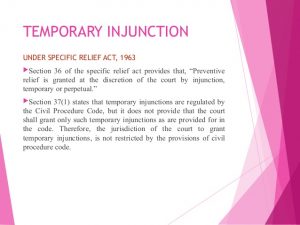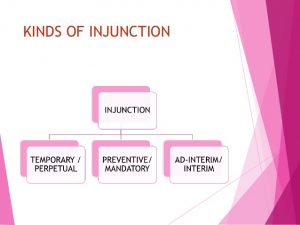Definition :
A temporary injunction is a court order prohibiting an action by a party to a lawsuit until there has been a trial or other court action. The purpose of a temporary injunction is to maintain the status quo and prevent irreparable damage or preserve the subject matter of the litigation until the trial is over. After the trial the court may issue a permanent injunction or dissolve the temporary injunction.
It is a provisional remedy granted to temporarily curb activity until the court can make a final decision after trial. It is usually necessary to prove the high likelihood of success upon the merits of one’s case and a likelihood of irreparable harm occurring without the granting of a temporary injunction.
The power to grant a temporary injunction is at the discretion of the court. This discretion, however, should be exercised reasonably, judiciously and on sound legal principles. Injunction should not be lightly granted as it adversely affects the other side. The grant of injunction is in the nature of equitable relief, and the court has undoubtedly power to impose such terms and conditions as it thinks fit. Such conditions, however, must be reasonable so as not to make it impossible for the party to comply with the same and thereby virtually denying the relief which he would otherwise be ordinarily entitled to. Generally, before granting the injunction, the court must be satisfied about the following aspect.
A relief of temporary injunction cannot be granted just for the mere asking of it after filing of a suit without adverting to the principles governing the grant of temporary injunction. Before an order of temporary injunction may be passed, the court must be satisfied that the applicant has a prima facie and arguable case to go into trial that the applicant shall suffer irreparable injury or loss unless the injunction is granted and that the balance of inconvenience is in favor of the applicant. Where the applicant fails to make out a prima facie case, the question of irreparable injury and balance of inconvenience does not arise and non-consideration of the points of irreparable loss and balance of inconvenience is not material.
In the case of a temporary injunction, the applicant must show (a) a prima facie case in support of the right claimed; (b) an actual or threatened violation of that right; (c) productive of irreparable or at least serious damage; (d) his conduct must be such as not to disentitle him to assistance but it should be fair and honest and in particular there must be no acquiescence or delay; (e) there must be a greater convenience in granting than refusing the injunction, and (f) equally efficacious relief must not be obtainable by any other usual mode or proceeding.
Prima facie case
Prima facie case, however, should not be confused with a case proved to the hilt. It is no part of the court’s function at that stage to try neither to resolve a conflict of evidence nor to decide complicated questions of fact and of law which call for detailed arguments and mature considerations. These are matters to be dealt with at the trial. (Emphasis supplied) In other words, the court should not examine the merits of the case closely at that stage because it is not expected to decide the suit finally. In deciding a prima facie case, the court is to be guided by the plaintiff’s case as revealed in the plaint, affidavits or other materials produced by him.
Explaining the ambit and scope of the connotation “prima facie” case, in Martin Burn Ltd. v. Banerjee, the Supreme Court observed, 42 DLR.
“A prima facie case does not mean a case proved to the hilt but a case which can be said to be established if the evidence which is led in support of the same were believed. While determining whether a prima facie case had been made out the relevant consideration is whether on the evidence led it was possible to arrive at the conclusion in question and not whether that was the only conclusion which could be arrived at on that evidence. It may be that the tribunal considering this question may itself have arrived at a different conclusion. It has, however, not to substitute its own judgment for the judgment in question. It has only got to consider whether the view taken is a possible view on the evidence on the record.
In order to get an order of temporary injunction, the applicant must make out a prima facie case in support of the right claimed by him. The existence of a prima facie right and infraction of such right is a condition precedent to the grant of temporary injunction. The burden is on the applicant to satisfy the court by leading evidence or otherwise that he has a prima facie case in his favour. The case must be established with sufficient material or proved by affidavit. The view that to establish a prima facie case it is not necessary to file documents or papers and it can be spelt out in the plaint is not correct. Where the impugned order of ad interim injunction does not show that there is a prima facie case in favour of the plaintiffs, the order suffers from non-application of judicial mind. In explaining what is meant by prima facie case, the High Court Division observed that it is a well-established principle of law that in order to get an order of temporary injunction, the plaintiff has to show that he has a good prima facie case meaning thereby that a serious question of law is to be tried in the suit. The court must be satisfied that there is a bonafide dispute raised by the applicant, that here is a strong case for trial which needs investigation and a decision on merits and that on the facts before the court there is a probability of the applicant being entitled to the relief claimed by him. A plaintiff in possession of the suit land has a prima facie case for injunction and the validity of the claim of title will have to be gone into in trial. Where license is cancelled without giving any opportunity of hearing, a prima facie case is made out. A prima facie case should not be confused with a case proved to the hilt. “Prima facie case is not to be confused with prima facie title which has to be established on evidence at the trial. A prima facie case alone is a substantial question raised, bona fide, which needs investigation and a decision on merits.” It is no part of the court’s function at that stage to try to resolve conflict of evidence, nor to decide complicated question of fact and of law which called for detailed arguments and mature consideration. These are matters to be dealt with at the time of trial. The court is not required to enter into the merit of the case as is necessary for passing a decree after hearing the evidence. The applicant has to show that a fair and arguable case exists in his favor. While determining whether a prima facie case had been made out, the relevant consideration is whether on the evidence or materials brought before the court it is possible to arrive at a conclusion in question and not whether that is the only conclusion which could be arrived at on that evidence or materials. An applicant is not required to make out a clear legal title, but to satisfy the court that he has a fair question to raise as to the existence of the legal right which he sets up, and that there are substantial grounds for doubting try existence of the alleged legal right, the exercise of which he seeks to prevent. In Mizanur Rahman v. Serajuddin, 37 DLR the High Court Division observed that ordinarily the acts which are sought to be restrained by injunction are those which are prima facie illegal or with respect to the legality of which there appears to be reasonable doubt in the mind of the court. The court further observed that the right that the plaintiffs want to assert in support of their claim must be a legal right and the injury that they allege must be a legal injury. However, the Appellate Division observed that the expression ‘legal injury’ should be avoided for a clearer expression; in order to get temporary injunction the applicant must claim a legal right and allege an injury which is not ordinarily reparable by monetary compensation. Plaintiffs who applied for lease of a vested property cannot obtain temporary injunction to restrain lease of the vested property to a third party. Temporary injunction or ad interim injunction cannot be granted where the plaintiff has no subsisting interest in the suit property. Where the lease for a short period expires, the lessee cannot have any subsisting right in the suit property and have no prima facie case for injunction. A plaintiff not being in possession for a long time or a plaintiff claiming through a lease from She bait who had no authority to lease out has no prima facie case for injunction. Where a plaintiff seeks injunction restraining dispossession, he must produce some evidence of possession by him.
Temporary injunction cannot be granted when it would lead to interference with and ultimately frustrate an order of the court passed under s.9 of the Specific Relief Act.


